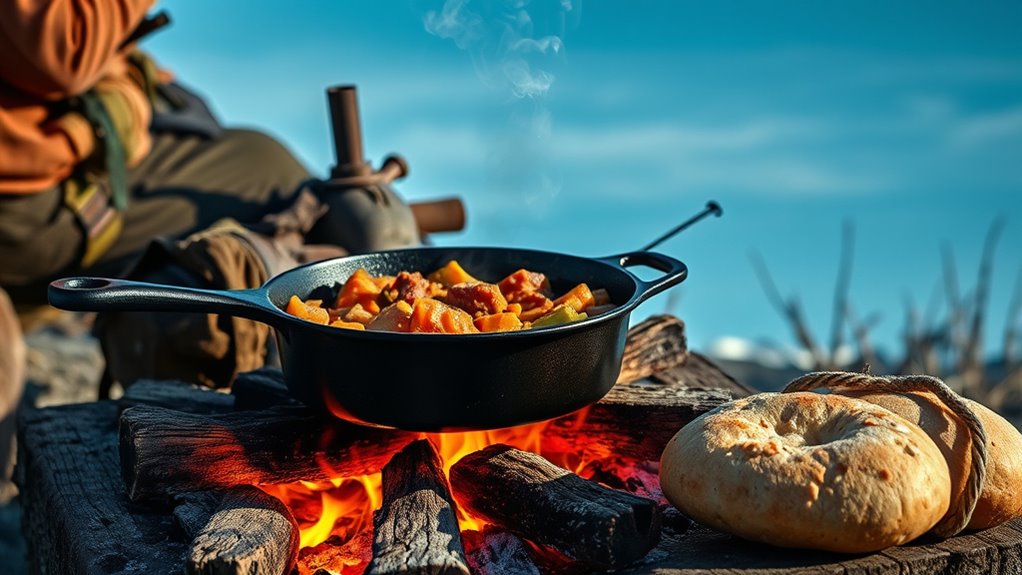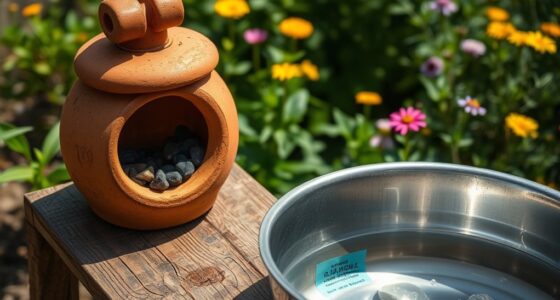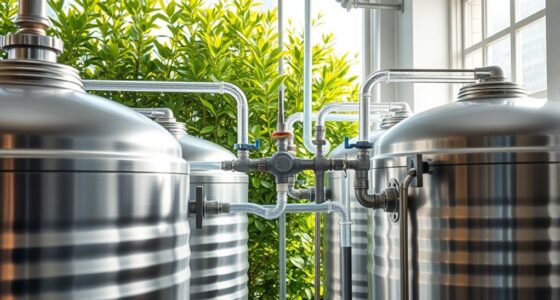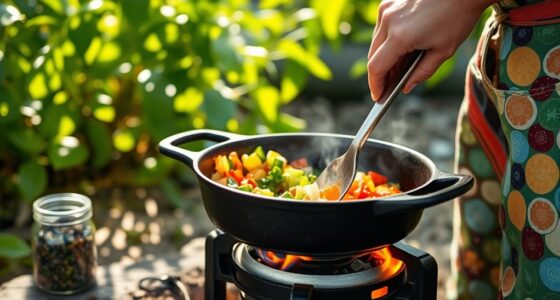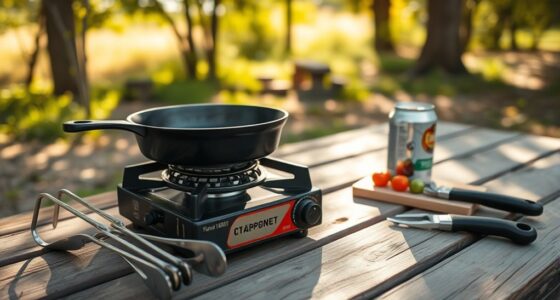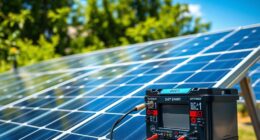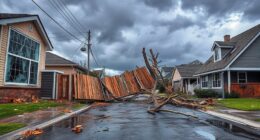During emergencies, you can cook food without electricity by using solar ovens or campfire techniques. Solar ovens harness the sun’s energy for baking, boiling, or roasting when the weather is sunny, making them eco-friendly and easy to set up. For outdoor fires, build a controlled campfire with safe tools, then cook over open flames using cast iron or simple pots. Mastering these methods helps you stay nourished and self-reliant—discover more ways to prepare for power outages below.
Key Takeaways
- Utilize solar ovens to cook meals outdoors using only sunlight, ideal for sunny conditions and emergencies.
- Prepare food over a campfire with cast iron cookware for grilling, boiling, and roasting in outdoor settings.
- Use portable stoves that operate on propane, butane, or other fuels as a backup for non-electric cooking.
- Opt for no-cook foods like canned goods, dried fruits, nuts, and ready-to-eat meals during power outages.
- Plan meals ahead with pre-packaged, non-perishable ingredients suitable for outdoor preparation without electricity.
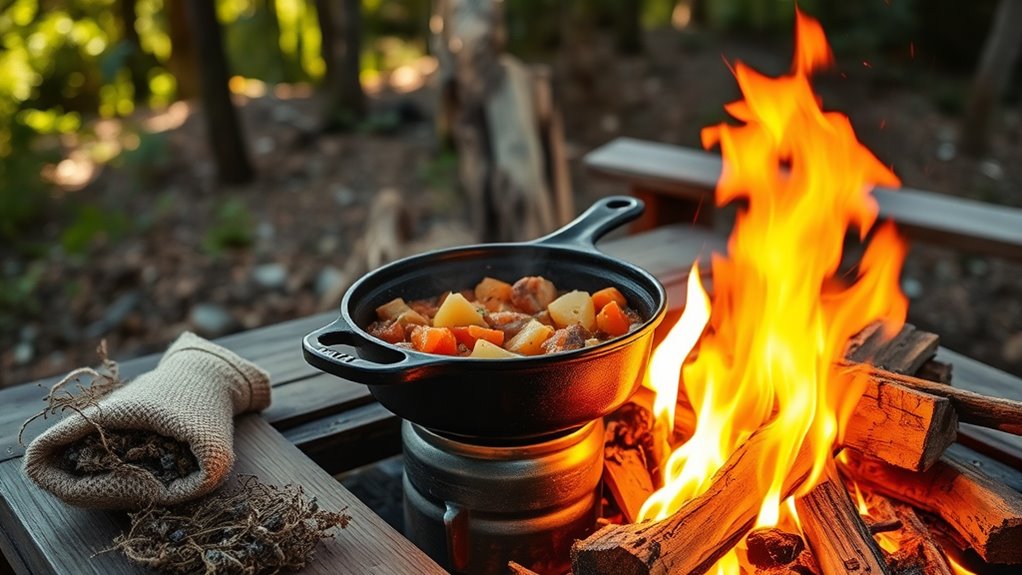
Have you ever wondered how to cook your meals during a power outage or emergency situation? When the electricity’s gone, it might seem like your options are limited, but there are effective ways to prepare food without relying on power. One of the most versatile tools you can have on hand is a solar oven. These devices harness the sun’s energy to cook food, making them perfect for outdoor emergencies. To use a solar oven, you simply place your ingredients inside, angle the device toward the sun, and wait. It’s a clean, renewable method that requires no fuel and minimal effort. Solar ovens are especially handy for baking, roasting, and even boiling water, provided the sun is shining strongly. They’re portable, easy to set up, and can cook a variety of meals, from stews to baked goods, giving you a reliable way to prepare food without electricity.
In addition to solar ovens, mastering campfire recipes is essential for emergency cooking. Knowing how to cook over a campfire opens up a world of possibilities. You can grill meats, simmer soups, or cook vegetables directly in pots or foil packets. Building a safe, controlled fire is your first step—make sure you’re in a suitable location and follow safety guidelines. Once your fire is ready, you can use cast iron pans or simple pots to prepare hearty meals. Campfire recipes are flexible; you can cook everything from breakfast pancakes to dinner stews. Plus, cooking over a fire often adds a smoky flavor that enhances your dishes. It’s important to have the right tools, like long-handled skewers, fire-safe utensils, and heat-resistant gloves, to keep yourself safe while cooking.
Both solar ovens and campfire recipes require some planning, but once you’re familiar with them, they become invaluable skills. Solar ovens are great for sunny days and can be set up ahead of time, while campfire cooking is straightforward and works anytime you have access to firewood or other燃料. Learning these methods means you’re not completely dependent on electricity, giving you peace of mind during emergencies. Additionally, understanding sauna construction and proper ventilation considerations can improve your preparedness for outdoor situations, ensuring safe and efficient cooking environments. Whether you’re preparing a simple snack or a full meal, these techniques help ensure you can nourish yourself and your loved ones without power. With a little practice, you’ll find that cooking without electricity isn’t just possible—it can be enjoyable and satisfying, especially when you see how resourceful you can be in a pinch.
Frequently Asked Questions
How Long Can Emergency Food Be Stored Without Refrigeration?
You can store emergency food without refrigeration for varying durations depending on the type. Canned foods, dried grains, and freeze-dried items often last 1 to 5 years, while fresh produce or perishable items have a shorter shelf life of days to weeks. Proper storage in cool, dark, and dry conditions prolongs your storage duration. Always check expiration dates and signs of spoilage to ensure your food remains safe to eat when needed.
What Are the Best Non-Electric Cooking Methods in Emergencies?
You can rely on solar ovens and open flame cooking as your best non-electric methods in emergencies. Solar ovens harness the sun’s power, turning daylight into cooking energy—saving you from the chaos of power outages. Open flame cooking, whether with a campfire or portable stove, offers quick, versatile heat. These methods are as dependable as a lighthouse in a storm, ensuring you can prepare meals safely and efficiently without electricity.
Are There Any Safety Concerns With Traditional Outdoor Cooking Equipment?
Outdoor grills and traditional outdoor cooking equipment are generally safe if you follow proper fire safety measures. Always set up on a stable, non-flammable surface, keep a fire extinguisher nearby, and never leave the equipment unattended. Verify proper ventilation to avoid smoke buildup, and check for leaks or damage before use. Being cautious with fire safety helps prevent accidents and keeps your outdoor cooking safe and enjoyable.
How Do You Prepare Fresh Ingredients Without Electricity?
You can prepare fresh ingredients without electricity by using solar ovens to cook or heat foods naturally, which is eco-friendly and efficient. Additionally, food dehydrators help you preserve fruits, vegetables, and herbs for later use, making meal prep easier. With these tools, you save energy, reduce waste, and enjoy fresh, wholesome meals even when power’s out. Just guarantee proper setup and safety precautions for ideal results.
Can Emergency Cooking Methods Preserve Nutrients Effectively?
Sure, emergency cooking methods can preserve nutrients, but don’t expect gourmet results. You’ll want to focus on gentle cooking techniques like steaming or boiling, which maximize nutrient retention. Ironically, the simplest methods often keep more vitamins intact than high-heat methods. So, when you’re limited without electricity, stick to these gentle techniques—they’re your best shot at preserving the nutrients your body needs to stay strong.
Conclusion
When the power’s out, cooking becomes your island in the storm, a beacon of hope and resilience. By mastering simple methods like open-fire or solar cooking, you turn chaos into calm. Think of it as your secret toolkit, always ready to light your way through darkness. With a little preparation and ingenuity, you’ll find that even without electricity, you can still nourish your body and spirit—proving that hunger doesn’t have to be your anchor.
